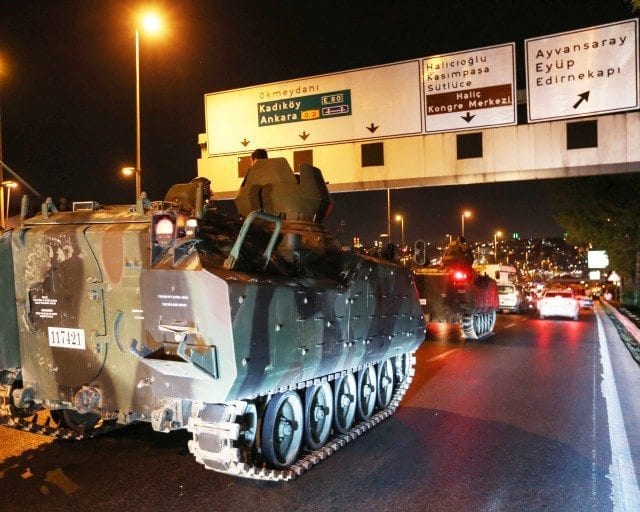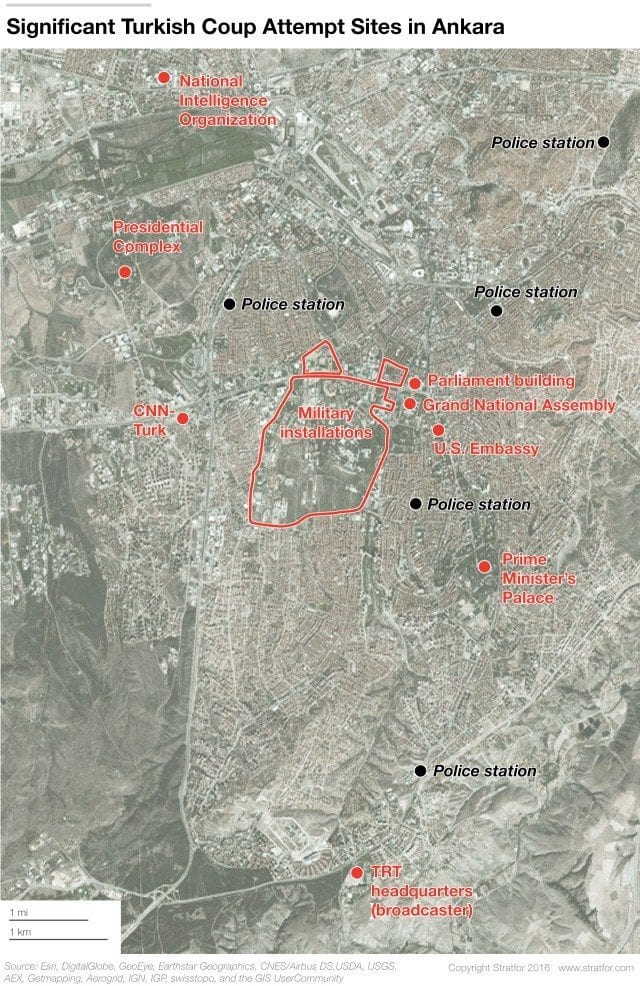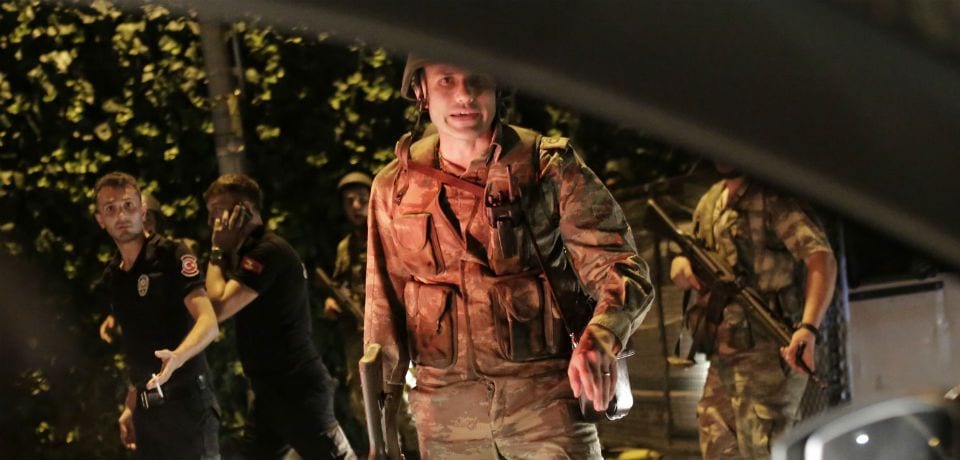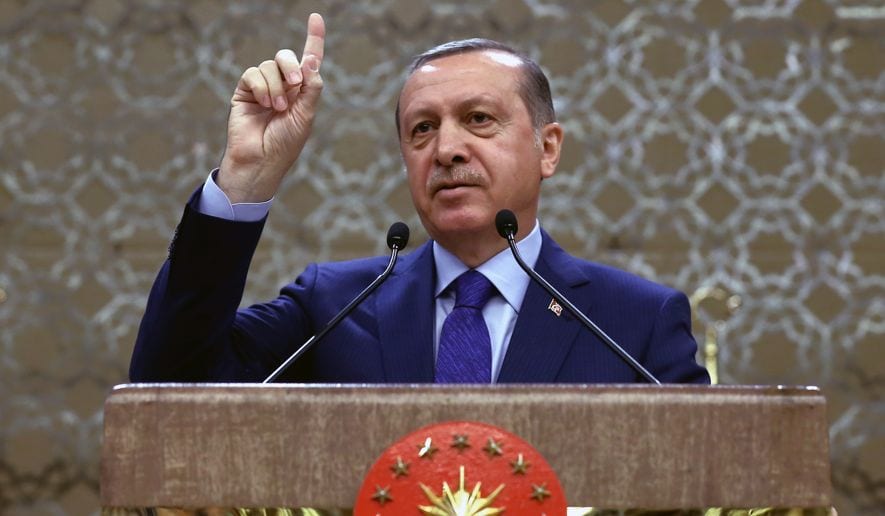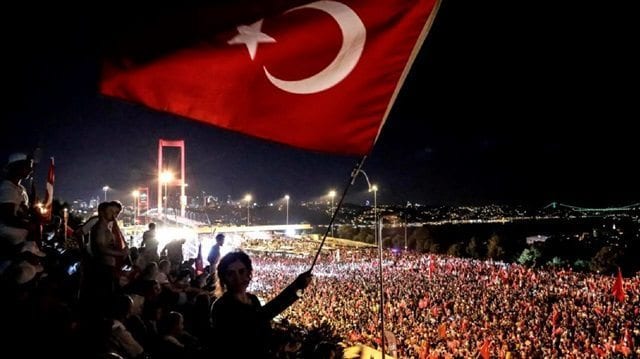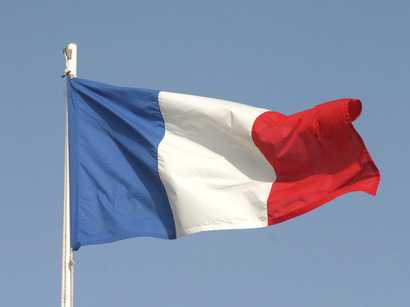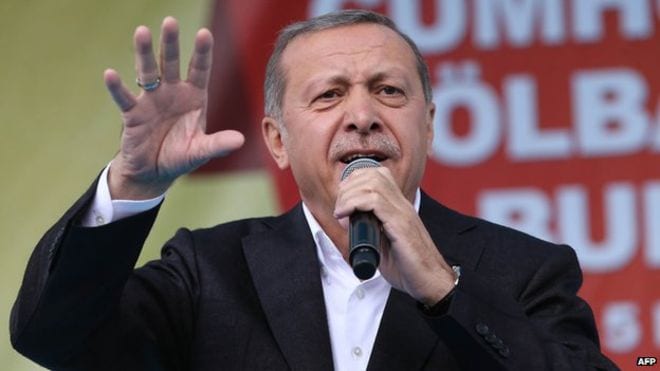
Recep Tayyip Erdogan’s AK Party enjoys a fierce and loyal support among Turkey’s conservative, Muslim base, while outside the country outrage grows over his silencing of critics, often by force.
Turkish journalists have been investigated and put on trial, foreign journalists have been harassed and deported. Last month, police raided Turkey’s biggest newspaper, Zaman. Its staff emerged bloodied and cowed.
Zaman’s last independent edition said Turkey’s press had seen one of its “darkest days”. Its first edition under state control carried unabashedly pro-government articles.
And Mr Erdogan’s authoritarian approach is not confined to Turkey’s borders. His bodyguards harassed reporters in the US, and a German satirist is under investigation in his home country for offending the Turkish president on TV.
Mr Erdogan, 61, came to power in 2002, a year after the formation of the AK Party. He spent 11 years as Turkey’s prime minister before becoming the country’s first directly-elected president in August 2014 – a supposedly ceremonial role.
In June 2015 the AK Party suffered a dip in the polls and failed to form a coalition. But a snap election in November, after Turkey’s worst suicide bombing prompted Mr Erdogan to escalate his war against the PKK, gave the party a convincing majority.
1970s-1980s – Active in Islamist circles, member of Necmettin Erbakan’s Welfare Party
1994-1998 – Mayor of Istanbul, until military officers made power grab
1998 – Welfare Party banned, Erdogan jailed for four months for inciting religious hatred
Aug 2001 – Founds Islamist-rooted AKP with ally Abdullah Gul
2002-2003 – AKP wins solid majority in parliamentary election, Erdogan appointed prime minister
Aug 2014 – Becomes president after first-ever direct elections for head of state
Challenging the military
n the decades before the AKP’s rise to power, the military had intervened in politics four times to curb Islamist influence.
In 2013 Mr Erdogan triumphed over the military elite when senior officers were among 17 people jailed for life, convicted of plotting to overthrow the AKP in what was known as the “Ergenekon” case.
Hundreds of other officers were also put on trial, along with journalists and secularist politicians, in that investigation and a similar one called the “Operation Sledgehammer” case.
When more than 200 officers were detained in the Sledgehammer investigation in 2011, the heads of Turkey’s army, navy and air force resigned in protest.
Critics accused Mr Erdogan of using the judiciary to silence political opponents, and there were many allegations of trumped-up charges.
But his supporters applauded him for taking on previously untouchable establishment figures, who saw themselves as guardians of the state created by Mustafa Kemal Ataturk.
Gezi Park protests
Image copyright Reuters
Image caption In June 2013 Mr Erdogan survived a challenge from opposition demonstrators in Istanbul
Mr Erdogan also unleashed the power of the state to crush mass protests in Istanbul in June 2013, focused on Gezi Park, a green area earmarked for a huge building project.
The protests spread to other cities, swelled by many secularist Turks suspicious of the AKP’s Islamist leanings.
A major corruption scandal battered his government in December 2013, involving numerous arrests, including the sons of three cabinet ministers.
Mr Erdogan raged against “plotters” based outside Turkey, condemning supporters of Fethullah Gulen. He also lashed out against social media, vowing to “wipe out” Twitter.
He has a combative charisma that many Turks in the teeming cities and small Anatolian towns love.
But his reputation took a hit in May 2014 when he reacted coldly to a mine disaster in Soma, western Turkey, which killed 301 people.
Muslim revival
Image copyright AFP
Image caption Some secularist critics bristle at the sight of Mr Erdogan’s wife in a headscarf
Mr Erdogan has denied wanting to impose Islamic values, saying he is committed to secularism. But he supports Turks’ right to express their religious beliefs more openly.
That message goes down particularly well in rural and small-town Anatolia – the AKP’s traditional heartland. Some supporters nicknamed him “Sultan” – harking back to the Ottoman Empire.
In October 2013 Turkey lifted rules banning women from wearing headscarves in the country’s state institutions – with the exception of the judiciary, military and police – ending a decades-old restriction.
Mr Erdogan’s wife Emine wears a headscarf to official functions, as does the wife of his long-standing AKP ally Abdullah Gul, who was president before him.
Critics also pointed to Mr Erdogan’s failed bid to criminalise adultery, and his attempts to introduce “alcohol-free zones”, as evidence of his alleged Islamist intentions.
Palatial ambitions
Mr Erdogan’s political opponents saw a lavish new presidential palace as a symbol of his alleged authoritarian tendencies.
Perched on a hill on the outskirts of Ankara, the 1,000-room Ak Saray (White Palace) is bigger than the White House or the Kremlin and ended up costing even more than the original £385m ($615m) price tag.
Image copyright EPA
Image caption The sprawling palace in Ankara has been highly controversial for Mr Erdogan
Mr Erdogan owes much of his political success in the past decade to economic stability, with an average annual growth rate of 4.5%.
Turkey has developed into a manufacturing and export powerhouse. The AKP government kept inflation under control – no mean feat, as there were years in the 1990s when it soared above 100%.
But in 2014 the economy began flagging – growth fell to 2.9% and unemployment rose above 10%.
On the international stage he has bitterly condemned Israel – previously a strong ally of Turkey – over its treatment of the Palestinians. The policy not only galvanised his Islamic base, but also made him a hugely popular leader across the Middle East.
He has backed Syria’s opposition in its fight against Bashar al-Assad’s government in Damascus.
But his tentative peace overtures to the Kurds in south-eastern Turkey soured when he refused to help Syrian Kurds battling Islamic State militants just across the border.
Islamic education
Image copyright Getty Images
Image caption Mr Erdogan became prime minister after elections in 2002
Born in 1954, Recep Tayyip Erdogan grew up the son of a coastguard, on Turkey’s Black Sea coast.
When he was 13, his father decided to move to Istanbul, hoping to give his five children a better upbringing.
As a teenager, the young Erdogan sold lemonade and sesame buns on the streets of Istanbul’s rougher districts to earn extra cash.
He attended an Islamic school before obtaining a degree in management from Istanbul’s Marmara University – and playing professional football.
While at university, he met Necmettin Erbakan – who went on to become the country’s first Islamist prime minister – and entered Turkey’s Islamist movement.
In 1994, Mr Erdogan became the mayor of Istanbul. Even his critics admit that he did a good job, making Istanbul cleaner and greener.
But in 1999 he spent four months in jail after a conviction for religious incitement.
He had publicly read a nationalist poem including the lines: “The mosques are our barracks, the domes our helmets, the minarets our bayonets and the faithful our soldiers.”
In 2001 Mr Erdogan launched the AKP with allies, having broken away from the Virtue Party, which had been banned.
His rise to power was complete when the AKP won a landslide election victory in 2002 and he became prime minister.



